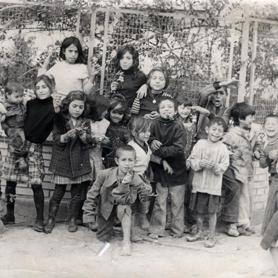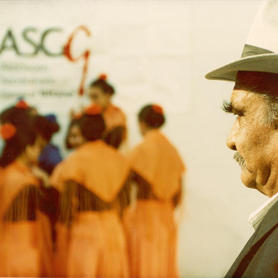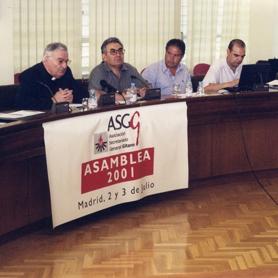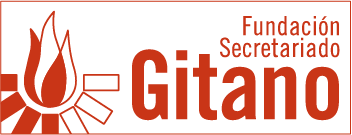Historia [editar]
Una historia de muchas historias. La de los gitanos y gitanas que han cambiado sus vidas en las últimas décadas. La historia de quienes acompañaron e impulsaron ese cambio. La de aquellas instituciones que se atrevieron a poner en marcha nuevos enfoques y políticas dirigidas al pueblo gitano. Es la Historia con mayúscula de una organización que pasó de estar en la sombra a convertirse en un referente europeo. Es, sobre todo, una historia de perseverancia.

Los inicios
La historia de la Fundación comenzó a perfilarse hace más de 45 años cuando, animados por el Concilio Vaticano II, nacen en los años 60 los Secretariados Gitanos con vocación de ofrecer de forma específica a las personas gitanas asistencia religiosa y social. La implicación personal de payos y gitanos, religiosos y seglares, puso los cimientos de lo que en el futuro sería la FSG.
En aquella época, la educación es una prioridad. Fruto de un convenio con el Ministerio de Educación surgen las Escuelas Puente, como una acción transitoria que permaneció en vigor diez años, hasta 1986.

Nace la Asociación Secretariado General Gitano (ASGG)
En el año 1982 se produce la creación de la Asociación Secretariado General Gitano (ASGG) como entidad civil sin ánimo de lucro. La Asociación se constituye por una asamblea de socios, con personas gitanas y no gitanas procedentes normalmente de Secretariados y asociaciones gitanas, y dirigida por una Junta Directiva de siete personas entre las que hay, asimismo, gitanos y no gitanos.
La decisión de constituir la asociación, obedece tanto a razones de índole logística como a una opción de fondo; entre las primeras, la fundamental era crear una entidad jurídicamente independiente de la Comisión Episcopal de Migraciones, que de una manera más ágil permitiese contratar a los maestros de las Escuelas Puente que se habían abierto en diferentes lugares de España. Las razones de fondo obedecieron a decisiones institucionales y a la voluntad de disociar el trabajo social y el trabajo pastoral que se desarrollase con gitanos.
La idea es que la misión social fuese llevada a cabo por una entidad independiente con estructura jurídica propia y de carácter democrático, abierta no solo a personas de la Iglesia sino a todas aquellas que compartiesen los fines y el objeto social de la promoción de los gitanos: esto se haría a través de la ASGG.

En el año 1982 se produce la creación de la Asociación Secretariado General Gitano (ASGG) como entidad civil sin ánimo de lucro
En esos momentos, la Asociación no gestiona recursos, sino que presta apoyo a asociaciones y grupos locales. Demuestra, ya entonces, la importancia que le dará al partenariado, que se convertiría en una de sus señas de identidad. También es una etapa en la que se desarrollan importantes investigaciones sobre la situación de la población gitana.
En los noventa fue tiempo de abrirse a Europa. La Unión Europea pone en marcha políticas para los más excluidos y ahí está el Secretariado dispuesto a que beneficien a la comunidad gitana.
En la década de los noventa, el Secretariado impulsa su actuación en Madrid. El convenio con el Ayuntamiento permite no sólo prestar servicios directos a la comunidad gitana madrileña, sino ensayar un nuevo modelo de intervención social de base territorial. La década de los noventa es fructífera también en difusión del conocimiento. Es en esta época cuando se pone en marcha el Centro de Documentación, convertido hoy en un referente internacional por su especialización.
La Asociación se transforma en Fundación
Con el nuevo siglo llegan nuevos aires. En 2001, la Asociación se transforma en Fundación. Adopta un nuevo modelo jurídico, es una organización más abierta. Se nutre de nuevas mentes.
Se constituye un Patronato plural, que quiere ser reflejo de la sociedad. Y con el nuevo siglo llega uno de sus grandes hitos: empezar a gestionar directamente fondos europeos, recursos dirigidos a mejorar las condiciones de vida de la comunidad gitana. Es una de las primeras ONG de Acción Social que lo consigue.
El programa Acceder, que comienza como experiencia piloto a final de los noventa, demuestra cómo trabaja la Fundación. Tiene un estilo propio: es capaz de innovar, de proponer nuevos enfoques.

Fundación Secretariado Gitano: Más de 25 años de historia
De nuevo la profesionalidad, el esfuerzo y la ética en las relaciones se imponen. La Fundación promueve un cambio de mentalidad: invita a la población gitana a superar la dependencia de las rentas sociales y a apostar por la formación y el trabajo por cuenta ajena. Acceder, siguiendo la periodicidad de los Fondos Estructurales se desarrolla durante 2000-2006 y 2007-2013; en este segundo periodo con nuevas líneas de actuación en educación y atención a inmigrantes gitanos.
En paralelo, la Fundación no cesa en su empeño de que la igualdad de oportunidades se dé en todos los ámbitos. En educación, vivienda, salud, juventud, igualdad de género, igualdad de trato, sensibilización, promoción cultural, voluntariado… trabaja en colaboración con los distintos ministerios e institutos oficiales.
Hoy en día la FSG lleva a cabo más de 500 programas al año que llegan a más de 100.000 personas. Las cifras empiezan a hablar por sí solas.
Enlaces
-
Los desafíos de la intervención social con la comunidad gitana
Artículo de Isidro Rodríguez, director general de la Fundación Secretariado Gitano, en el nº49 de la revista Rediteia (de EAPN Portugal)
-
Secretariado Gitano: 37 años de historia
Artículo escrito por José Manuel Fresno en la revista "Gitanos, pensamiento y cultura"
-
Fundación Secretariado Gitano: Más de 25 años de historia
Artículo de Revista "Gitanos, pensamiento y cultura"
- Premios y menciones recibidos por la FSG a lo largo de su historia

